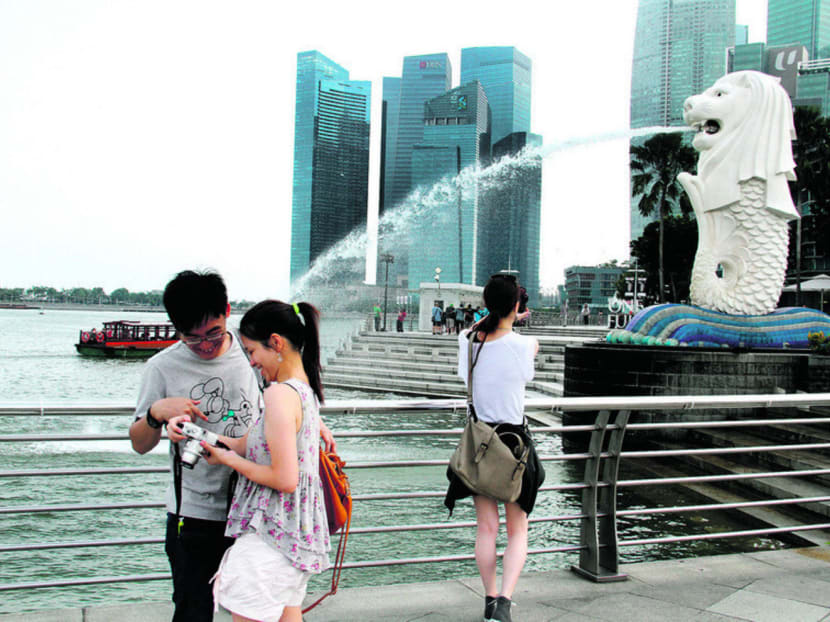Weakened dollar ‘could boost exports, tourism’
SINGAPORE — Export-oriented and tourist-dependent businesses yesterday welcomed the boost from the Monetary Authority of Singapore’s (MAS) unexpected decision to slow down the appreciation of the Singapore dollar.

STB statistics showed tourist arrivals to Singapore in the first 11 months of last year fell 3.4 per cent, with tourist arrivals from Asia dropping 4.1 per cent from 2013. TODAY FILE PHOTO
SINGAPORE — Export-oriented and tourist-dependent businesses yesterday welcomed the boost from the Monetary Authority of Singapore’s (MAS) unexpected decision to slow down the appreciation of the Singapore dollar.
These companies would see their goods and services become more competitive. However, those reliant on imports could feel the pinch from a weakened dollar.
Mr Zaheer Merchant, director of Pan Asia Logistics Singapore, said the weakened dollar would make the Singapore logistics industry “extremely attractive” to overseas clients.
“Exporting will be a lot cheaper. (The shift in monetary policy) is very timely as, due to low oil prices, freight service prices have become very competitive,” he said.
Mr Patrick Chang, managing director of Paclin Office Products, which exports to South-east Asia, Hong Kong and Macau, said a slower appreciation of the dollar would give their clients more buying power.
“This is important because Singapore is the region’s main distributor.” Besides office supplies, Paclin also exports identification systems, as well as bookbinding and laminating equipment.
A cheaper Singapore dollar could also encourage tourism to Singapore. Mr Vincent Tan, director of Select Group, which owns a variety of food and beverage outlets including Chinatown Food Street, said he saw fewer tourists at his outlets last year.
“Tourists — especially those from countries with weaker currencies — who have stayed away because Singapore was ‘too expensive’ will come back (as a result of the move),” he said.
The Singapore Tourism Board’s statistics showed that tourist arrivals to Singapore in the first 11 months of last year fell 3.4 per cent, with tourist arrivals from Asia dropping 4.1 per cent, from 2013.
Mr Julian Chia, who runs a tattoo shop in City Hall, was however, less enthused with the move.
“Most of our products such as the needles, ink and machines are shipped from the US and Australia. If the Singapore dollar is weak, then it will mean we have to spend more after conversion,” said Mr Chia, 27. He buys these items at least once a month.
Mr Sunny Koh, deputy president of the Singapore Manufacturing Federation Council, said the move may not benefit all businesses. “At the end of the day, (it) also depends on the country of import or export, and the nature of their currencies.”
The Singapore dollar slid to its lowest yesterday since 2010 after the MAS announced it would reduce the slope of the currency band in which the Singapore dollar fluctuates, but will maintain the width and the level at which it is centred. The move places Singapore among the list of countries that have acted to shield their economies from slowing inflation.
Economists said that the Singapore dollar will still fare well against most other currencies. “For the man on the street, (the weaker dollar would mean) less purchases of goods that are denominated in US dollars. But a lot will have to depend on the foreign currency that we’re comparing with,” said UOB economist Francis Tan.
Freelance model Monique Freidank, 24, who travels frequently and regularly shops online for clothes, books and other products not found in Singapore, said that a weaker Singapore currency would mean that she would have to make cutbacks on her spending and travelling.
Association of Small and Medium Enterprises (ASME) president Kurt Wee said that he does not foresee the policy shift having any significant impact on SMEs, save for some buyers of imports.
He added that SMEs in Singapore have “been through worse things and tougher times”. “The industry has survived financial crises and diseases like SARS. This currency shift will do little to shake it,” he said.






